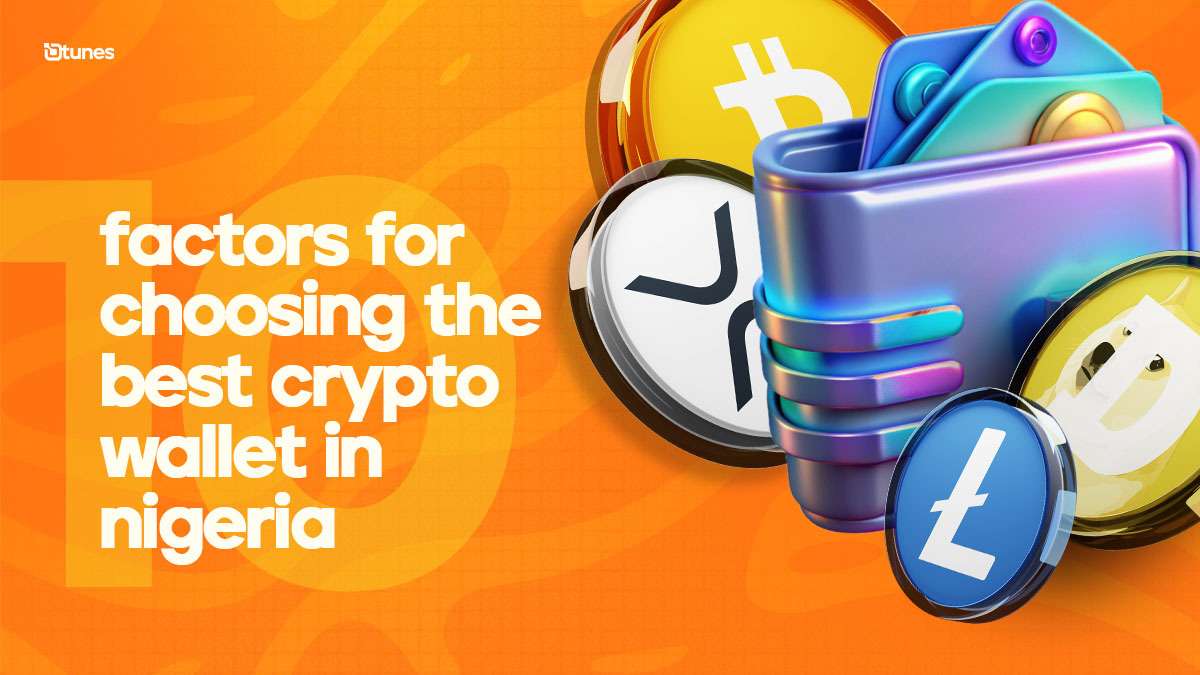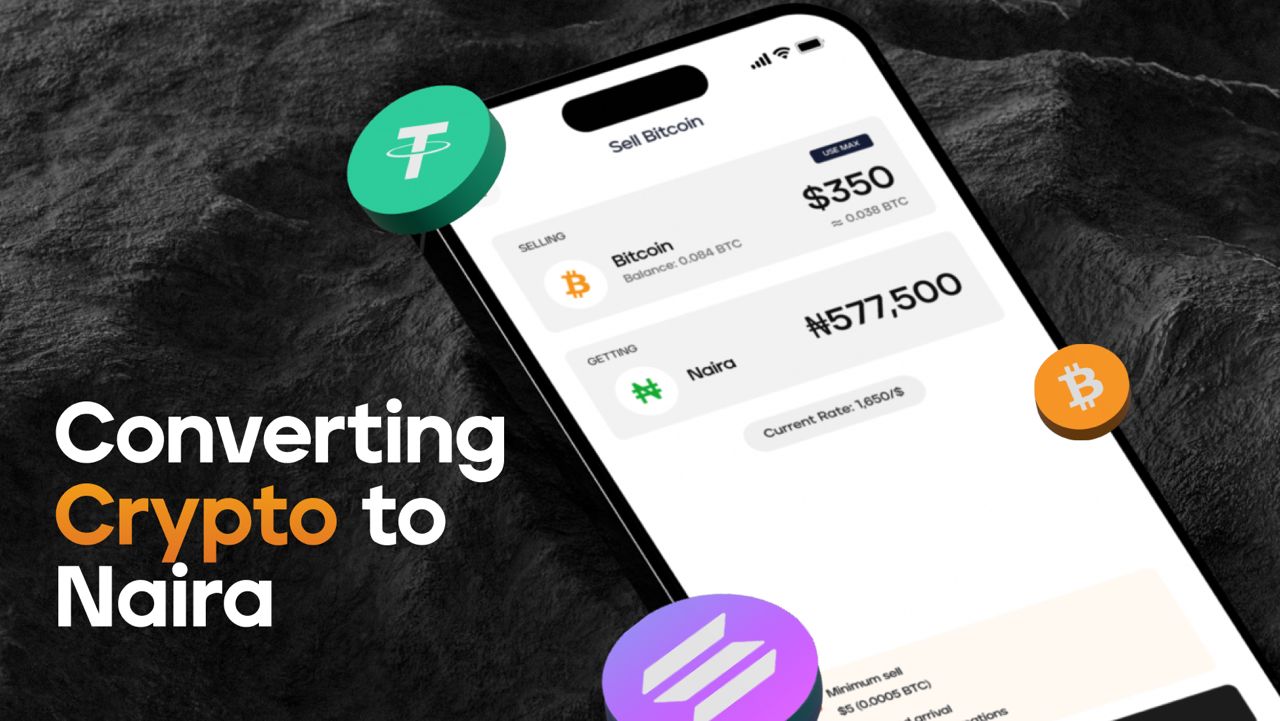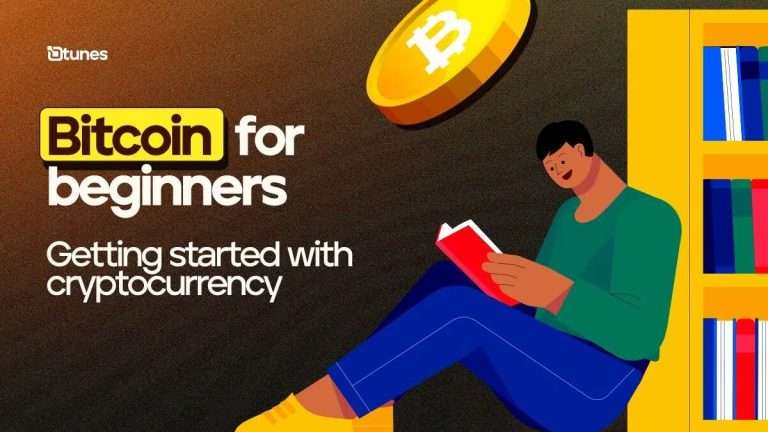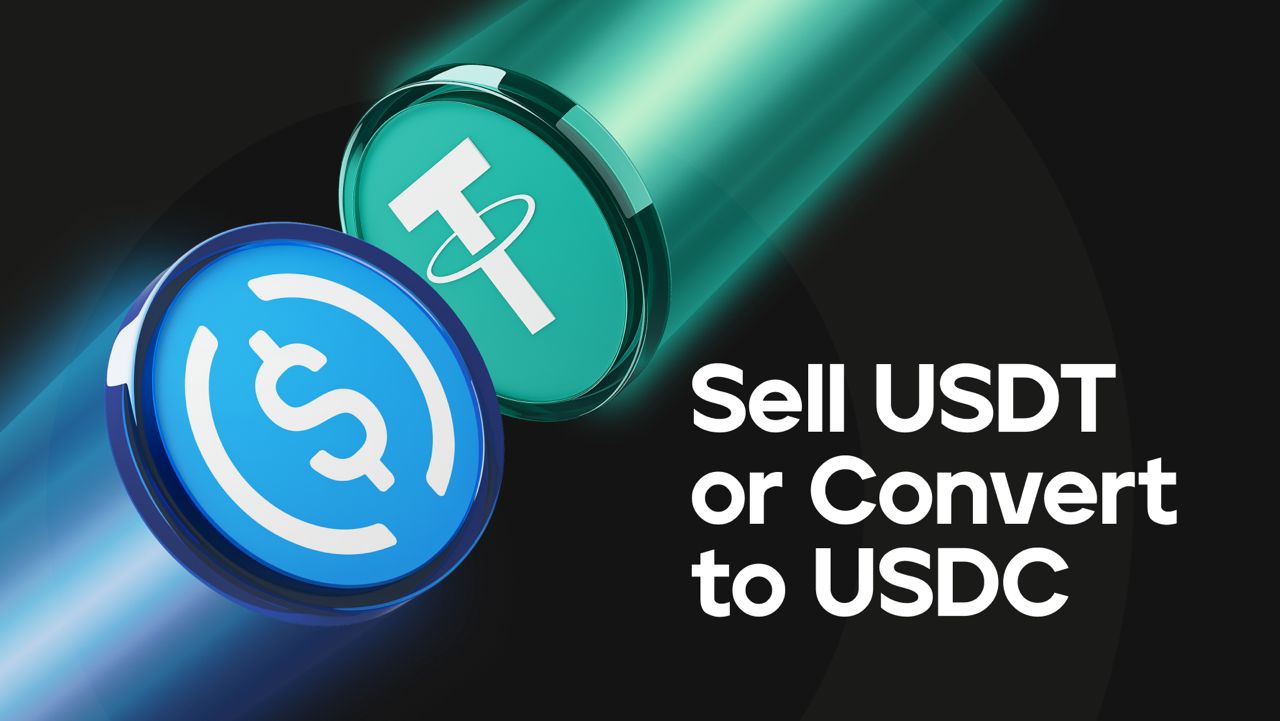
10 Factors for Choosing the Best Crypto Wallet in Nigeria
Choosing the best crypto wallet in Nigeria to trade is very crucial, especially when you are starting out transacting with cryptocurrency in Nigeria.
With the rising adoption rates, scrutinized regulations, and increasing cyber threats, a reliable and efficient crypto wallet is what you need to ensure your digital assets remain safe and accessible.
A crypto wallet is more than just a digital bank; it is your gateway to seamless transactions, decentralized applications (dApps), and much more.
There are numerous options available, but choosing the best one can be overwhelming. In this guide, we’ll explore ten key factors to consider when choosing a crypto wallet in Nigeria.

How to choose the best crypto wallet
The following are the factors you should consider before choosing a crypto wallet:
- Security and Private Management
- Regulatory Compliance and Legal Standing
- Wallet Type: Hot vs. Cold Storage
- Supported Cryptocurrencies and Tokens
- User Experience and Accessibility
- Transaction Fees and Network Costs
- Backup and Recovery Options
- Integration with DeFi and NFTs
- Customer Support and Community Trust
- Multi-Platform Availability
1. Security and Private Key Management
Security is the most important factor when selecting a crypto wallet. A good crypto wallet must offer robust security features to protect your funds from cyber threats and unauthorized access.
The best crypto wallets ensure non-custodial private key management, meaning only the wallet owner has access to their private keys. This prevents centralized exchanges or third parties from controlling your funds.
Custodial wallets, such as those on centralized exchanges (e.g., Binance, Luno, or Coinbase), hold users’ private keys on their behalf, making them more vulnerable to security breaches.
Types of security features to look for:
- Multi-signature (multi-sig) authentication: Requires multiple approvals before a transaction is completed, adding an extra security layer.
- Biometric authentication: Some wallets support fingerprint or facial recognition to prevent unauthorized access.
- Two-factor authentication (2FA): Ensures that an extra verification step is needed before accessing or transacting from the wallet.
- Cold storage capability: Cold wallets (offline wallets) reduce exposure to hacking attempts by storing private keys offline.
For maximum security, hardware wallets like Ledger Nano X and Trezor Model T are highly recommended because they store private keys offline, protecting users from malware, phishing, and exchange hacks.
2. Regulatory Compliance and Legal Standing
With Nigeria’s evolving crypto regulations, selecting a compliant and legally recognized wallet is crucial.
The Central Bank of Nigeria (CBN) has placed restrictions on financial institutions regarding crypto transactions, making it essential to choose a wallet that aligns with regulatory frameworks.
Why is compliance important?
- Some wallets require Know Your Customer (KYC) verification to comply with anti-money laundering (AML) laws.
- KYC-compliant wallets offer added security and legitimacy, reducing the risk of fraud and illicit transactions.
- Non-custodial wallets like Trust Wallet and MetaMask allow users to retain full control over their assets without requiring KYC.
For those using custodial wallets tied to exchanges like Binance, Luno, and Quidax, ensure that the platform follows regulatory guidelines and has clear withdrawal policies.
3. Wallet Type: Hot vs. Cold Storage
Crypto wallets are categorized into hot wallets (online wallets) and cold wallets (offline wallets). Each has its advantages and uses:
- Hot Wallets: These are connected to the internet and include mobile, web, and desktop wallets. Examples include Trust Wallet, MetaMask, and Binance Wallet. Hot wallets are convenient for frequent transactions but are more susceptible to cyberattacks.
- Cold Wallets: These are offline wallets like Ledger Nano X, Trezor Model T, and KeepKey. Cold wallets offer the highest level of security as they are immune to online hacking attempts.
Keep everyday-use crypto in a hot wallet and large holdings in a cold wallet. This is best for balance between security and accessibility.
4. Supported Cryptocurrencies and Tokens
Nigeria has a growing interest in multiple cryptocurrencies, with Bitcoin (BTC), Ethereum (ETH), USDT (Tether), Binance Coin (BNB), and NGNT (Naira-backed stablecoin) among the most traded assets.
Choosing a wallet that supports multiple cryptocurrencies and blockchain networks allows for flexibility. Multi-currency wallets like Trust Wallet, Atomic Wallet, and Exodus enable users to store and transact various assets without needing multiple wallets.
Consider wallets that support popular blockchains such as Ethereum (ERC-20 tokens), Binance Smart Chain (BEP-20 tokens), Solana, and Polygon to maximize compatibility.
5. User Experience and Accessibility
A crypto wallet should be easy to navigate, even for beginners. The best wallets offer:
- A simple, intuitive interface for quick transactions and portfolio tracking.
- Cross-platform availability, including mobile, desktop, and web versions.
- Seamless integration with exchanges for easy deposits and withdrawals.
Trust Wallet and Binance Wallet are top choices in Nigeria due to their user-friendly interfaces and mobile accessibility.
6. Transaction Fees and Network Costs
Transaction fees can significantly impact crypto trading profitability. Some wallets allow users to adjust gas fees manually, while others have fixed charges.
- Ethereum wallets (MetaMask, Trust Wallet) often face high gas fees, which vary based on network congestion.
- Binance Smart Chain wallets tend to have lower transaction costs compared to Ethereum.
- Centralized wallets (Binance, Luno, Quidax) may charge withdrawal fees depending on the token being transferred.
Opt for wallets that offer customizable gas fees and low-cost blockchain networks for transactions.
7. Backup and Recovery Options
Losing access to a crypto wallet can result in permanent loss of funds. The best wallets provide strong backup and recovery options, such as:
- 12 to 24-word seed phrase recovery (mandatory for non-custodial wallets).
- Cloud backup options (for specific wallets like Coinbase Wallet).
- Multi-device synchronization for seamless access across platforms.
Always store your seed phrase offline in a secure location(Don’t screenshot or Screen-record!).
8. Integration with DeFi and NFTs
Decentralized Finance (DeFi) and Non-Fungible Tokens (NFTs) are growing in Nigeria. If you plan to interact with DeFi apps or store NFTs, choose a wallet that integrates seamlessly with dApps.
- MetaMask and Trust Wallet support Ethereum-based DeFi platforms like Uniswap and Aave.
- Phantom Wallet is ideal for Solana-based DeFi and NFTs.
9. Customer Support and Community Trust
A good crypto wallet should offer responsive customer support, including:
- 24/7 live chat or email support.
- Active community forums (Reddit, Telegram, Discord).
- A transparent company background with positive user reviews.
Wallets like Binance and Luno have strong customer service teams and active Nigerian communities.
10. Multi-Platform Availability
Your wallet should work on multiple devices for seamless accessibility. Popular multi-platform wallets include:
- Trust Wallet (mobile only)
- MetaMask (browser extension and mobile)
- Exodus (desktop and mobile)
The right crypto wallet gives you peace of mind and the confidence to navigate the crypto world without fear.
Take the time to weigh these ten factors, you are not just protecting your investments, you are empowering yourself to build wealth, secure your digital future, and embrace financial freedom in the age of decentralized finance.
Conclusion
Choosing the best crypto wallet in Nigeria requires careful consideration of security, usability, transaction fees, and regulatory compliance.
Whether you’re a trader, investor, or DeFi enthusiast, selecting a wallet that meets your needs will ensure the safety and efficiency of your crypto assets.
Think of this as choosing a trusted vault for your hard-earned assets, ensuring that no matter what happens in the market, your funds remain secure and accessible.
For More Crypto Related Articles
- Crypto Investments: 10 Tips to Secure Crypto Assets in 2025
- What Does Airdrop Mean in Crypto | How to Earn Airdrops
- How to Trade Bitcoin to Naira at Best Rate
Frequently Asked Questions (FAQs)
1. Which wallets support NGNT and other Nigerian stablecoins?
Wallets like Trust Wallet, Binance Wallet, and Quidax support NGNT and other stablecoins used within Nigeria’s crypto market.
2. What is the best crypto wallet for beginners in Nigeria?
Trust Wallet and Binance Wallet are excellent options for beginners due to their easy-to-use interfaces, mobile compatibility, and strong security features.
3. Are hardware wallets necessary for Nigerian crypto investors?
If you hold large amounts of cryptocurrency, a hardware wallet like Ledger Nano X or Trezor Model T is highly recommended for enhanced security.
4. Can I use a Nigerian bank account to fund my crypto wallet?
Due to CBN restrictions, direct funding from Nigerian bank accounts to crypto exchanges is limited. However, peer-to-peer (P2P) trading on platforms like Binance and Paxful allows users to buy crypto using bank transfers.
5. What should I do if I lose my crypto wallet private key?
If you lose your private key and do not have a recovery phrase, your funds may be irretrievable. Always back up your private key and store it securely offline.
Disclaimer: This content is informational and should not be considered financial advice. Readers are encouraged to do thorough research before making any investment decisions. The Dtunes is not responsible for any financial losses.
Godwin has spent the last 5 years making SEO magic happen and now leads as SEO Manager at Dtunes. When he’s not tweaking search rankings, you’ll catch him vibing to music, playing games, or hanging out with friends.





